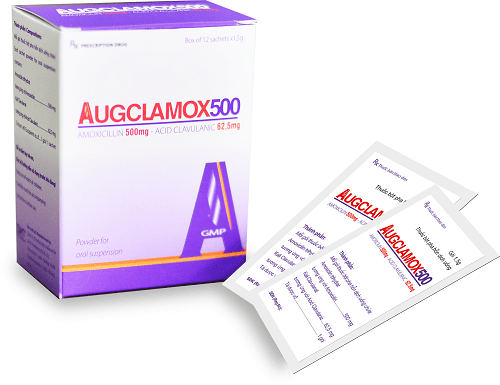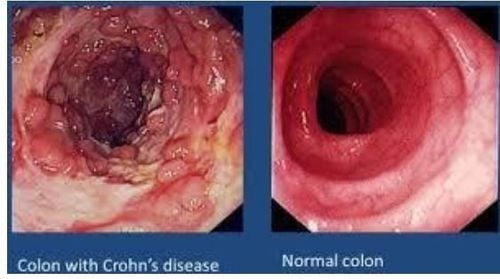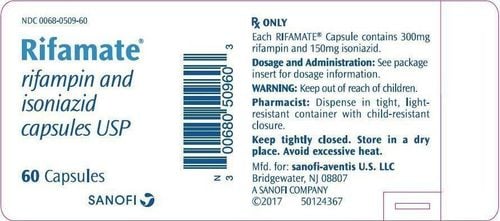This is an automatically translated article.
Biclary belongs to the group of anti-parasitic, anti-infective, anti-viral, anti-fungal drugs. The drug is indicated for the treatment of common bacterial infections. Let's learn about Biclary drug about how to use it and the notes when using it to ensure safety and effectiveness for patients.
1. What is Biclary?
Biclary contains ingredients Clarithromycin 250mg or 500mg and other excipients just enough for 1 tablet provided by the manufacturer. The drug is prepared in the form of film-coated tablets, packaged in a box of 2 blisters, 3 blisters, each blister contains 10 tablets.
2. What does Biclary drug do?
Biclary is indicated for the treatment of the following cases:
Skin and soft tissue infections. Inflammation of the upper respiratory tract such as sinusitis, pharyngitis, otitis media, tonsillitis. Lower respiratory tract infections such as: Acute bronchitis, chronic bronchitis, pneumonia, COPD exacerbations. Combination treatment of peptic ulcers caused by Helicobacter pylori. Kills bacteria Mycoplasma pneumoniae and Legionella causing pneumonia, diphtheria, early stage of whooping cough, opportunistic infections caused by Mycobacterium. In addition, Biclary is contraindicated in the following cases:
Patients who are allergic to the active ingredient Clarithromycin or other excipients contained in the drug. Patients with a history of bradycardia, arrhythmia, heart disease with approx. QT prolongation, coronary insufficiency, electrolyte imbalance.
3. Dosage and how to take Biclary
Biclary drug is made in the form of film-coated tablets, so the drug is taken orally. The drug should be swallowed whole, the patient should not chew, crush or break the tablet before taking it.
Because the drug is not affected by food, it can be taken before or after a meal without reducing the extent or speed of drug absorption.
Below is the dosage of Biclary drug:
Adults:
Use at a dose of 250mg x 2 times daily for 7 days continuously, or 500mg of adjusted release form once daily. In severe infections it can be increased to 500mg twice daily, or 1000mg of a modified release form once daily and continued for up to 14 days. In the case of combination treatment of peptic ulcers caused by Helicobacter pylori, the usual dose is 500mg x 2 times daily, used continuously for 7 days. Patients should be used in combination with Omeprazole 40mg orally twice a day. Children over 12 years old:
Use the same dose as adults. Children under 12 years: Use this drug in the form of emulsions for pediatric patients with the following specific doses:
The daily dose for children is 7.5mg/kg body weight, 2 times a day until the time of death. The maximum dose is 500mg. The duration of each course of treatment is 7-10 days, depending on the strain of bacteria causing the disease and how severe or mild the disease is. In the case of strep throat, it is necessary to treat it for at least 10 days. The prepared solution can be taken with or without meals and can be taken with milk. Elderly:
Use at the same dose as adults. Patients with renal impairment:
No dose adjustment is necessary unless the patient has severe renal impairment (based on creatinine clearance less than 30ml/min. Adjustment should reduce the total dose by half per day. Note: The above dosage is for reference only by the manufacturer. Depending on your health condition and different medical conditions, your doctor will base it on you. Therefore, the patient should only use the drug when prescribed by the doctor and instructed to use it properly.
4. Biclary drug side effects
Doctors always consider between the benefits that Biclary brings to the patient and the possible risk of side effects to prescribe the appropriate medication.
Biclary is well tolerated, some side effects that may be encountered when taking the drug include:
Digestive disturbances, nausea, vomiting, dyspepsia, diarrhea, abdominal pain. Stomatitis, glomerulonephritis, raised nodules around the mouth. Headache, allergic reactions ranging from urticaria and mild skin rashes to anaphylaxis and, rarely, Stevens-Johnson syndrome. Taste disturbance, loss of color in the tongue. Anxiety, dizziness, insomnia, hallucinations, psychosis, nightmares, confusion. Loss of hearing. Pseudomembranous colitis, liver dysfunction, hepatitis and biliary tract infection with or without associated jaundice. Note: In addition to the side effects listed above, Biclary medicine may cause other unwanted effects that have not been fully identified. Therefore, at any time when a patient takes a drug, there are suspected related side effects, they should immediately notify the doctor or pharmacist for clear advice and intervention when necessary.
5. Biclary drug interactions
When used in combination with the following drugs with Biclary, the following interactions may occur:
Use in combination with drugs used to treat epilepsy: Biclary inhibits the metabolism of drugs such as Carbamazepine and Phenytoin. increase their side effects. Biclary drug inhibits metabolism leading to prolonged QT interval, torsades de pointes, and ventricular fibrillation. Biclary inhibits the hepatic metabolism of theophylline and increases its plasma concentrations leading to the risk of drug toxicity. It also reduces the absorption of Zidovudine. The use of Biclary in patients taking Warfarin may potentiate its effects. Therefore, prothrombin time should be regularly monitored in these patients. The efficacy of Digoxin may be increased by concomitant administration of Biclary, so serum levels of Digoxin should be monitored. There may be other interactions of Biclary with food or other drugs not listed above. Therefore, stop using this medicine and seek medical attention as soon as any unusual reactions occur.
To avoid interactions, before being prescribed Biclary, the patient should inform the doctor about the drugs they are using, including functional foods.
6. Notes when using Biclary
Some notes when patients take Biclary drugs are as follows:
Biclary drugs are excreted mainly by the liver and kidneys. Therefore, caution should be exercised when using this antibiotic in patients with impaired liver or kidney function. Prolonged and repeated use of Biclary may lead to the development of strains of fungi or bacteria that are no longer susceptible to the drug. In case of superinfection, the patient should be instructed to stop taking the drug and start treatment according to the appropriate regimen. There is a risk of increased serum concentrations of drugs when used in combination with Biclary that is metabolised by the cytochrome P450 system. The patient takes the medicine exactly as directed by the doctor. Adhere to the treatment time of the doctor to avoid taking the wrong drug, which may have the risk of drug resistance. Do not stop taking the drug suddenly when you see that the clinical symptoms have improved... Absolutely do not give Biclary medicine to other people if you see the disease condition with similar symptoms. Before using the medicine, check the expiry date of the medicine written on the outside of the medicine packaging, if the medicine has expired, it should not be used. Each drug has a different shelf life recommended by the manufacturer, when the drug has expired, it should not be used and disposed of properly. Pregnancy: Biclary can cross the placental barrier, although the potential risk to the fetus has not been clearly established. In case it is necessary to use the drug, you should consult a doctor to avoid consequences that may affect the fetus such as miscarriage, malformation, ... For children whose mothers during pregnancy have Using Biclary drug, after giving birth should be closely monitored for signs of adrenal insufficiency. Lactation: According to clinical studies, Biclary is known to be excreted in breast milk, so the drug may affect the baby while the mother is breastfeeding. In case a nursing patient must take Biclary, breast-feeding should be discontinued before starting treatment.
7. What to do in case of missed dose or overdose of Biclary?
If you forget to take your medicine, take it as soon as you remember. The drug can be taken about 1-2 hours later than the daily dose. But when it is almost time for the next dose, the missed dose should be discarded. Patients should absolutely not make up for a double dose. When taking an overdose, patients often experience symptoms such as itching, skin allergies, nausea, vomiting, dizziness, hypotension, convulsions, shortness of breath, respiratory failure, tachycardia... In this case, the patient should stop taking the drug immediately when detecting the above side effects and notify the treating doctor. Family members should take the patient to the hospital for timely examination and treatment. Patients should also bring the medications they have used so that the doctor can get information and handle it quickly and promptly. Hopefully the above article has provided all relevant information about the uses, dosage and some notes when using Biclary medicine. Patients need to take Biclary exactly as directed by the doctor. Note, Biclary is a prescription drug, patients can only use this drug when prescribed by a specialist.
Follow Vinmec International General Hospital website to get more health, nutrition and beauty information to protect the health of yourself and your loved ones in your family.
Please dial HOTLINE for more information or register for an appointment HERE. Download MyVinmec app to make appointments faster and to manage your bookings easily.













